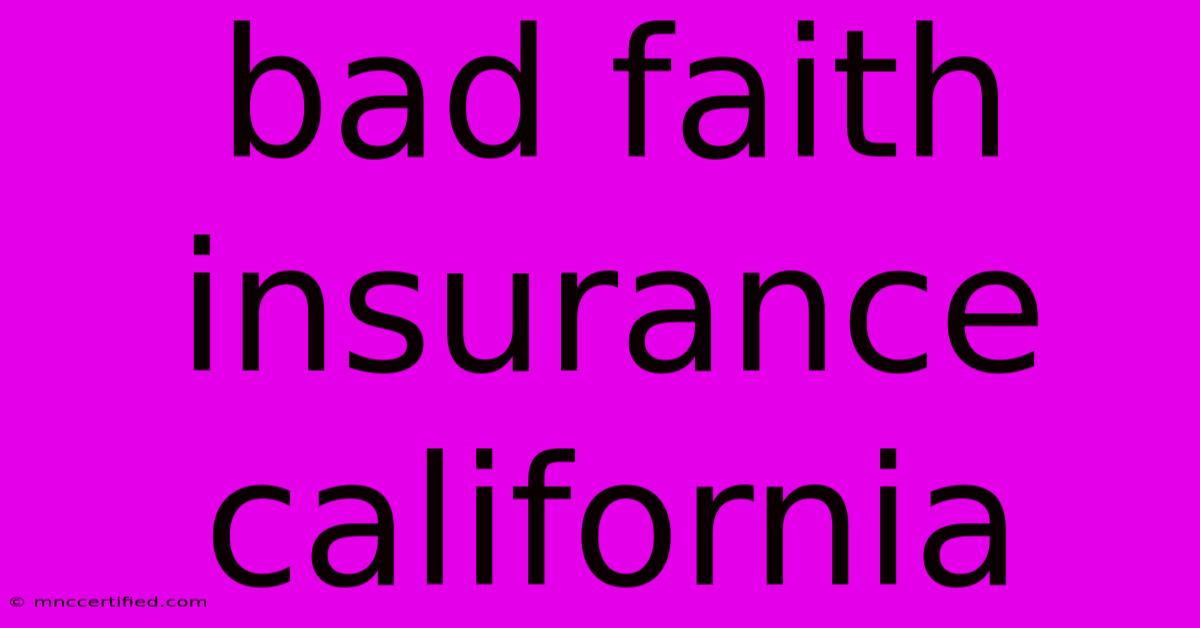Bad Faith Insurance California

Table of Contents
Navigating the Murky Waters of Bad Faith Insurance in California
California law protects policyholders from insurance companies acting in bad faith. This means if your insurer unfairly denies, delays, or undervalues your claim, you may have grounds to sue them for bad faith. Understanding what constitutes bad faith in California is crucial for protecting your rights. This article will explore the complexities of bad faith insurance claims in California, providing insights for both policyholders and insurers.
What is Bad Faith Insurance in California?
Bad faith insurance in California refers to an insurance company's unreasonable and wrongful conduct in handling a claim. This isn't simply a disagreement over the value of a claim; it involves a breach of the implied covenant of good faith and fair dealing. This covenant requires the insurer to act honestly and fairly in dealing with its insured. Actions that demonstrate bad faith often involve:
- Unreasonable Delay in Investigating or Processing a Claim: Prolonged delays without justifiable cause can constitute bad faith. This includes failing to promptly investigate the claim, failing to communicate with the insured, or unnecessarily delaying payments.
- Unreasonable Denial of a Claim: Denying a valid claim without proper investigation or sufficient evidence constitutes bad faith. This especially applies if the denial is based on flimsy grounds or ignores clear evidence supporting the claim.
- Unfair Valuation of a Claim: Offering a significantly low settlement offer that is not supported by evidence or fails to adequately compensate for the insured's losses is a clear indicator of bad faith.
- Failure to Communicate with the Insured: A lack of communication regarding the progress of a claim, failure to return phone calls or respond to correspondence, or providing misleading information can all contribute to a bad faith claim.
- Improper Use of Independent Medical Examiners (IMEs): Pressuring or coercing an insured to attend an IME, or using IME reports to unfairly minimize the extent of an injury, may constitute bad faith.
Examples of Bad Faith in California Insurance Cases:
- Auto Accident Claim: An insurer delays investigation for months, refusing to contact witnesses or obtain police reports, leading to a severely undervalued settlement offer.
- Homeowners Insurance Claim: After a fire, the insurer claims the damage is due to negligence and denies the claim based on a biased investigation without providing sufficient evidence.
- Disability Insurance Claim: The insurer fails to properly review medical evidence, citing minor inconsistencies to deny a long-term disability claim despite the claimant's clear medical limitations.
Proving Bad Faith in California: The Burden of Proof
To successfully sue an insurance company for bad faith in California, you must prove that:
- A valid insurance policy existed.
- A claim was submitted under the policy.
- The insurer acted unreasonably and without proper justification in handling the claim. This often involves showing a pattern of behavior or specific acts of bad faith.
- The unreasonable conduct caused damages to the insured. This includes not only the financial losses from the undervalued or denied claim but also potential emotional distress and punitive damages.
Consequences of a Bad Faith Finding
A successful bad faith lawsuit can result in significant consequences for the insurance company, including:
- Payment of the full value of the claim: The insurer is required to pay the actual damages sustained by the insured.
- Additional damages for emotional distress: The insured may be awarded compensation for the stress and anxiety caused by the insurer's bad faith actions.
- Punitive damages: In cases of particularly egregious bad faith, the court may award punitive damages to punish the insurer and deter similar behavior in the future.
- Attorney's fees and costs: The insurer is usually required to pay the insured's attorney's fees and court costs.
Seeking Legal Counsel for Bad Faith Claims in California
Navigating bad faith insurance claims in California is complex. If you believe your insurance company has acted in bad faith, it's crucial to seek legal counsel from an experienced California bad faith insurance attorney. They can assess your case, gather evidence, and represent your interests throughout the legal process. Remember, acting quickly is essential; many claims have statutes of limitations.
Keywords: Bad faith insurance California, California bad faith insurance, insurance bad faith claim, insurance company bad faith, bad faith lawsuit California, unfair insurance practices California, California insurance law, insurance claim denial, delayed insurance claim, undervalued insurance claim, California insurance attorney, bad faith insurance lawyer
This article provides general information and should not be considered legal advice. Consult with a qualified attorney for advice tailored to your specific situation.

Thank you for visiting our website wich cover about Bad Faith Insurance California. We hope the information provided has been useful to you. Feel free to contact us if you have any questions or need further assistance. See you next time and dont miss to bookmark.
Featured Posts
-
Tmj Botox Covered By Insurance
Nov 27, 2024
-
Is Morgan Freeman Missing A Hand
Nov 27, 2024
-
Hibs 3 Aberdeen 3 Points Shared
Nov 27, 2024
-
Top Covid Role For Bhattacharya
Nov 27, 2024
-
Homeowners Insurance Weston Fl
Nov 27, 2024